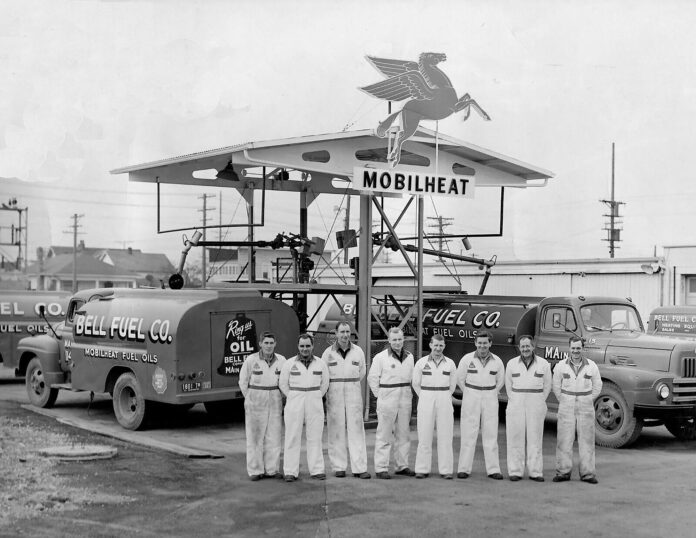The Great Depression began in August 1929 after the rapid economic expansion of the Roaring Twenties ended. The October 1929 stock market crash plus a series of regional banking crises in 1930 and 1931 accentuated the despair. In Washington State, lumber mills were particularly hard hit when homebuilding markets dried up. Although Guy D. Bell, in partnership with Henry J. Meyers, operated a successful sawmill in Port Orchard, by 1931 they were forced to close their doors and lost everything.
Guy Bell returned to Tacoma in autumn 1931 with one remaining asset from the failed mill – a second-hand typewriter worth $15. Looking for opportunities, Bell spotted a small truck for sale whose owner was asking $12. An unlikely swap was negotiated, and Guy D. Bell drove away in that small pickup and soon began hauling sawdust and firewood after cutting a deal with Samuel Gange’s Tacoma lumber mill. Pure sawdust was sold to local residents and as one of the cleanest and most economical fuels.
Bell Fuel Company grew from those humble beginnings and in time handled a complete line of wood, coal, sawdust, Presto-logs, plus diesel and stove oil products hauled by fleets of fuel trucks. Ever the entrepreneur, Guy Bell also expanded into the sale and installation of heating units such as the Peerless and Jordan brands of automatic coal stokers. The company experienced healthy growth throughout the decade and by 1939 occupied two city blocks bounded by Sprague Ave. and Ferry St. between 12th and 14th streets in Central Tacoma. Last week’s column featured one of Bell Fuel’s self-service vending machines, likely located on the Sprague Ave. property.
Soon enough, William H. Bell and Edgar Bell, both graduates of Stadium High School, joined their father in the heating business. Bell’s fuel oil delivery trucks, like those seen above, came equipped with tamper-proof meters that measured pumped gallons with a read-out registering numbers big enough to be seen by customers in their homes.
In the early days, Guy Bell purchased Dodge delivery trucks from Tacoma’s Irwin-Jones Motor Co. with servicing to equip oil deliveries performed by Owen and Lige Dickson’s Welding and Equipment Co. By the time of this 1954 photo, Bell Fuel Company’s fleet consisted of International trucks. Pegasus, the flying red horse was the logo associated with Mobil’s fuels, both gasoline and diesel.
Beginning in the 1950s, businesses like Tacoma’s Bell Fuel Company and their cross-town rival, Griffin Fuel slowly lost market share to heating sources that could be delivered by wires or pipelines – electricity and natural gas. Today in Washington State over 91% of residential heat is supplied by either electricity (57.6%) or natural gas (33.5%). Diesel fuel oil now heats only 1.5% of Washington homes, with bottled gas or propane (3.2%), firewood (2.9%), while other sources provide the rest.
Research assistance for this column was provided by Ilona Perry at the Northwest Room of Tacoma Public Library.








